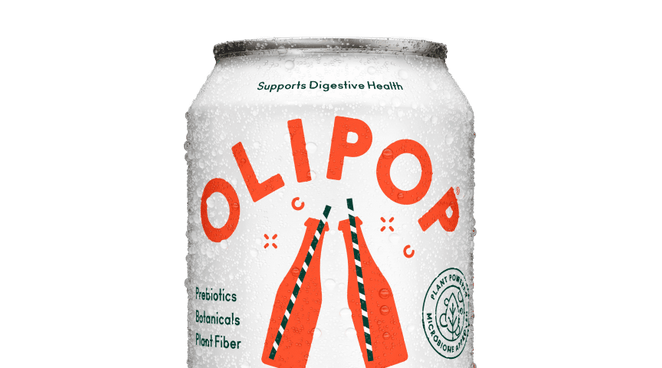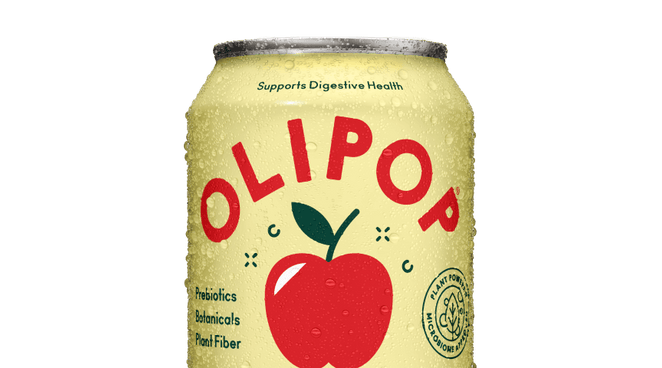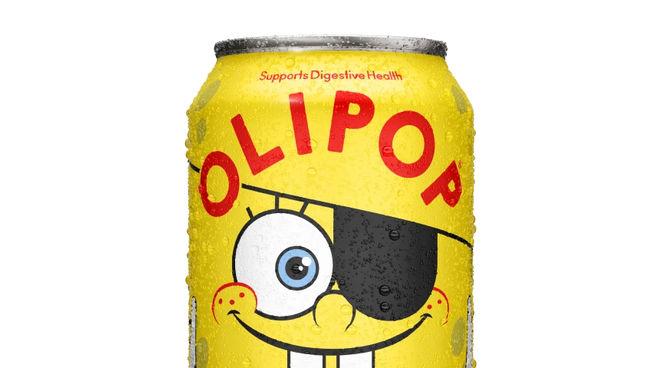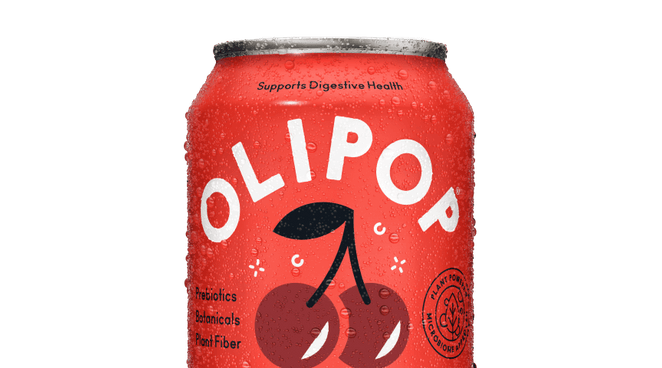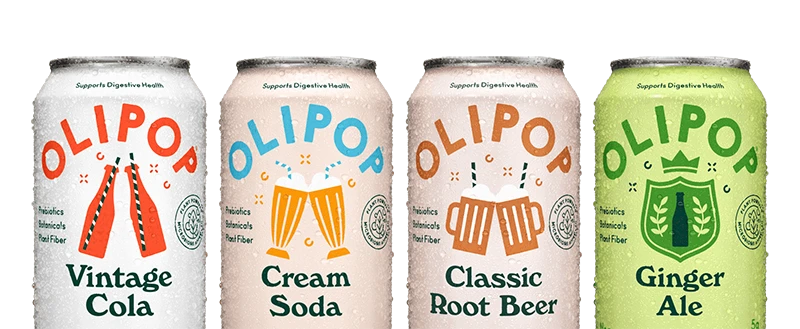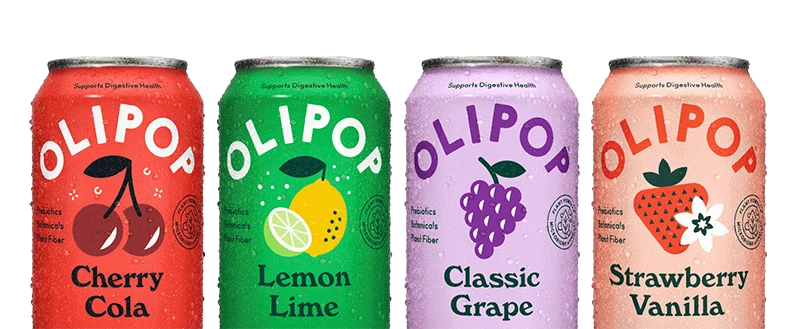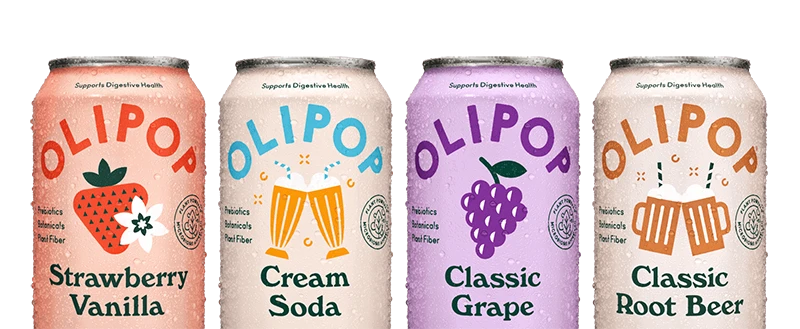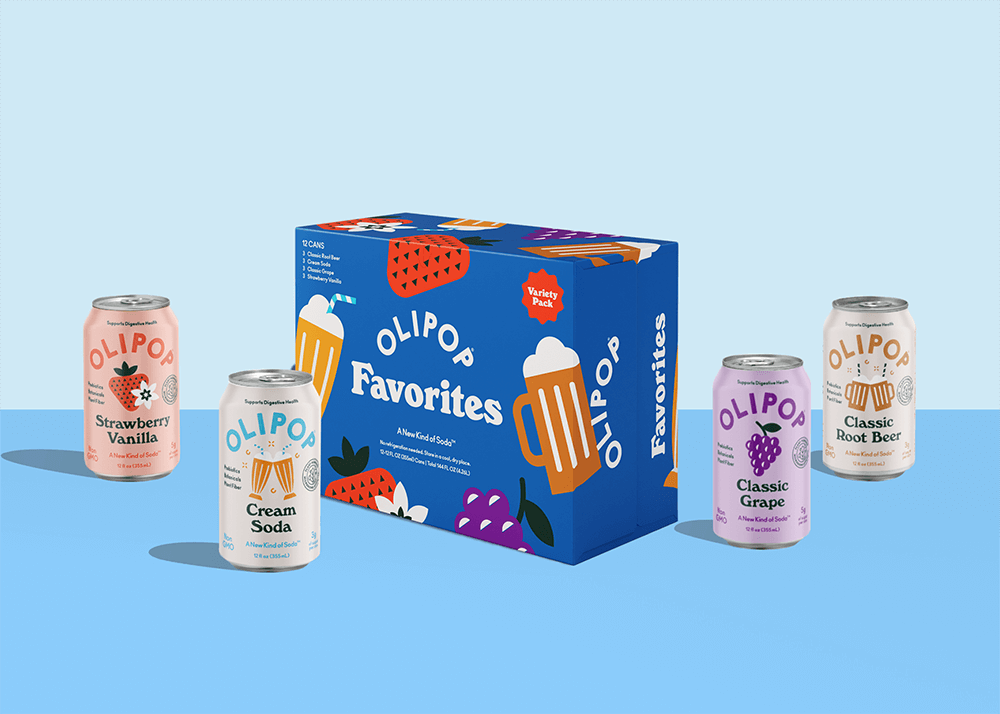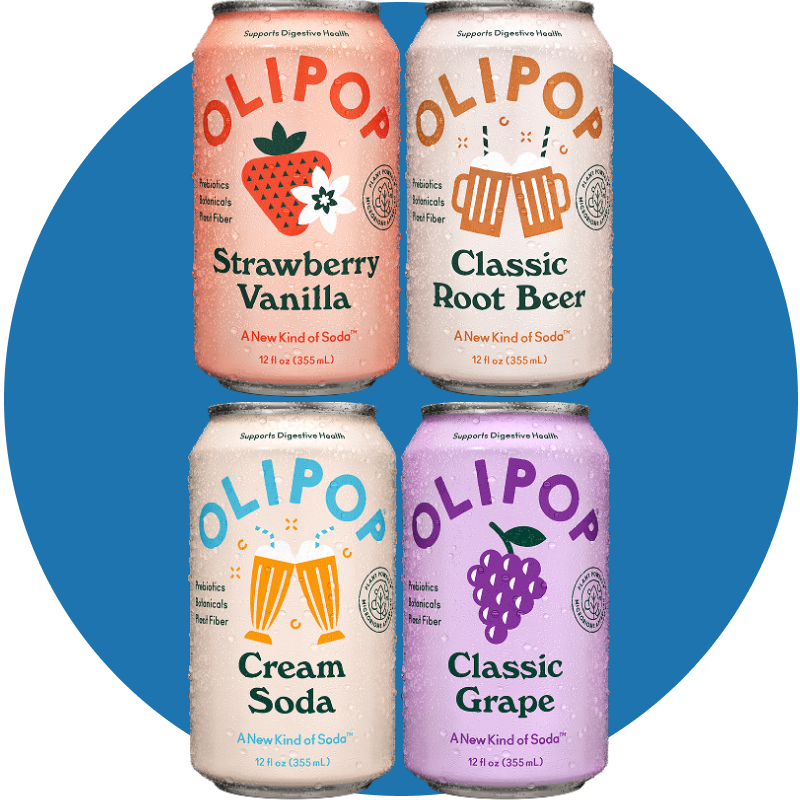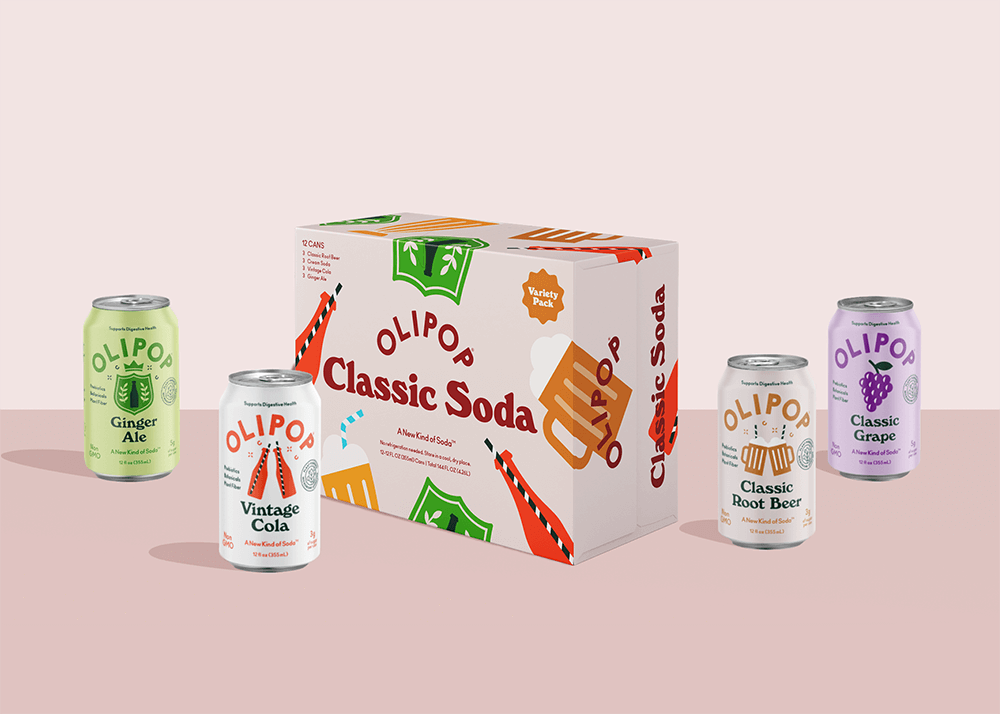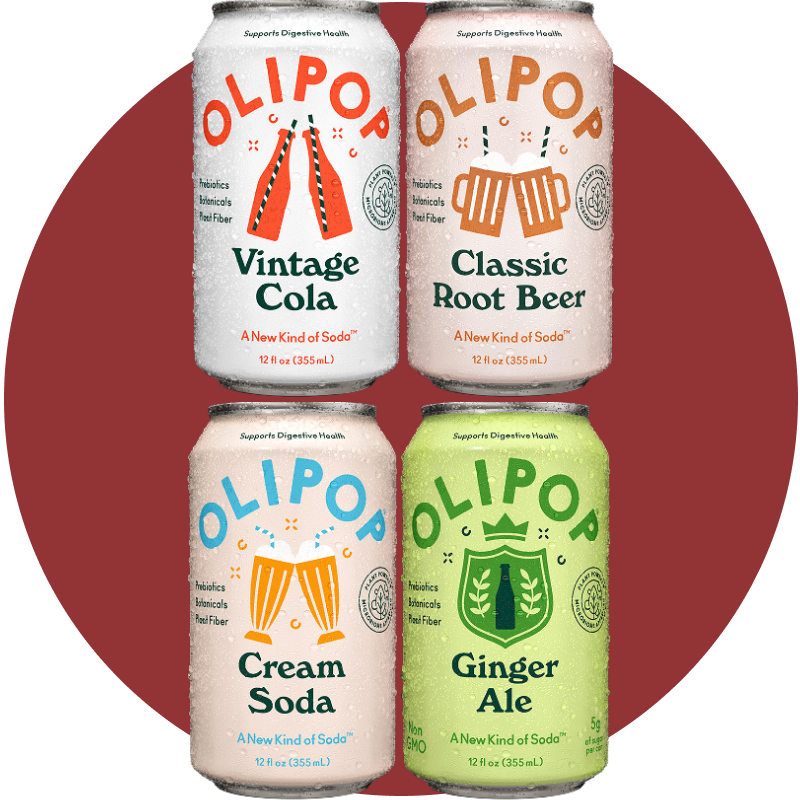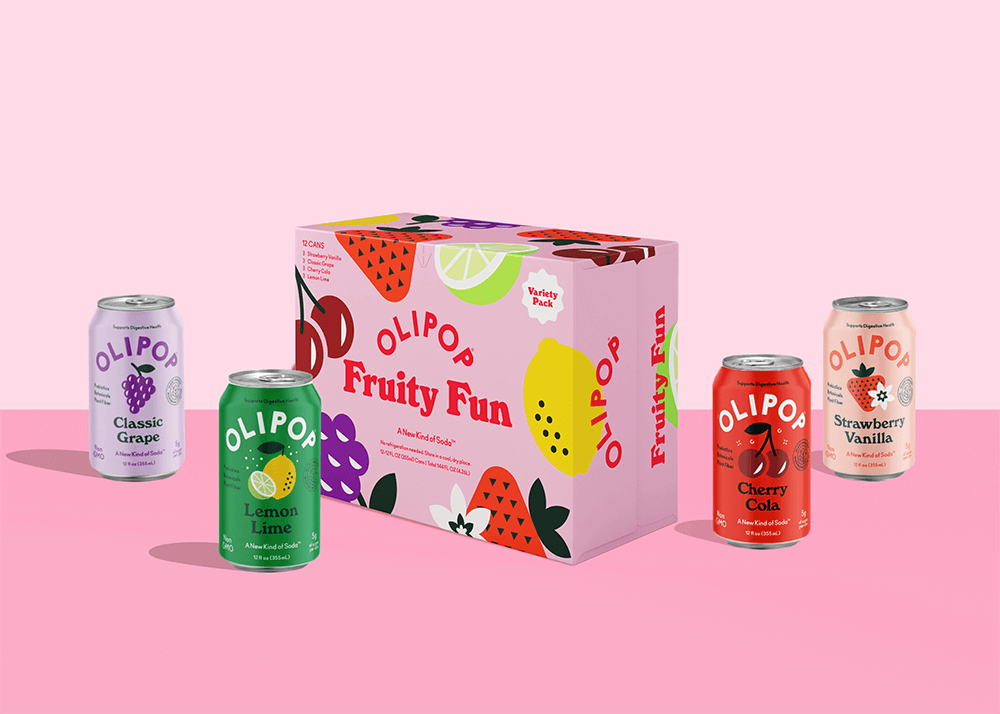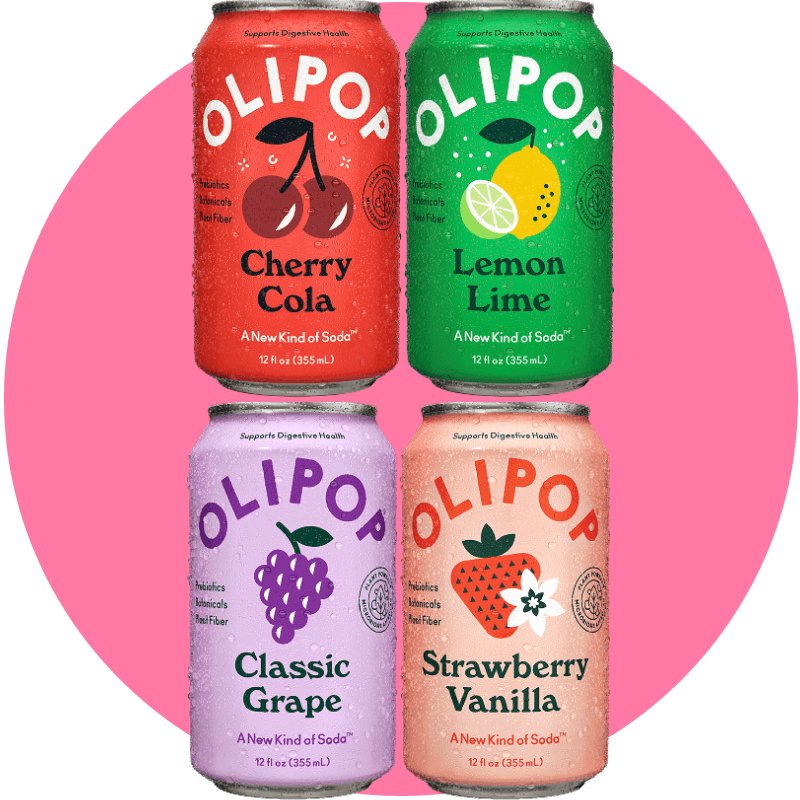Editor's Note: This article is reviewed by Lauren Manaker MS, RDN, LD, a registered dietitian and a paid contributor to OLIPOP. She specializes in digestive health and reviews OLIPOP content for scientific accuracy.
There’s a new soda on the scene, and it’s here to help support your digestive health. It’s called prebiotic soda, and it’s packed with gut-supporting prebiotic fiber. But what exactly is prebiotic soda? And are these sodas worthy of the hype?
As a dietitian, I am a big fan of these buzzy sodas. In this article, I’ll share exactly why that is. It won’t be long till you’re tempted to grab one off the shelf to try for yourself!
What Is Prebiotic Soda?
Prebiotic soda is a carbonated soft drink packed with prebiotic fiber to support your gut. By adding nutritious, high-fiber ingredients, it joins the soda aisle as a gut-friendly option for soda drinkers. Just like regular soda, prebiotic soda features a delicious taste and bubbly experience once you pop open the can. Yet a quick look at the back ingredient label highlights just how different it is from a regular can of soda.
Prebiotic Soda vs. Traditional Soda
Traditional sodas are packed with sugar, artificial flavorings, and not much else—offering very little in the nutrition department. Thankfully, new soda brands are spinning traditional sodas on their heads, adding botanicals, plant compounds, and other ingredients that increase the nutritional value of their cans.
And one exciting new ingredient is prebiotics in prebiotic soda. This indigestible ingredient can offer up some unique health benefits that sugary empty-calorie sodas can never rival. By adding prebiotics, prebiotic soda joins the soda aisle as a bubbly, gut-friendly option for soda drinkers. Here's what makes it so different from your more traditional can of soda:
Fewer Sugar Calories
Many prebiotic sodas contain far fewer sugar calories than a standard can of soda. OLIPOP contains 2 to 5g of sugar, while the leading soda brands contain anywhere from 39 to 45g of added sugar.
Better-for-you Ingredients
Prebiotic sodas also contain more natural vs artificial ingredients like natural vanilla or caramel flavoring and real fruit juice that help make them a good choice.
Instead of the high fructose corn syrup you’ll find in regular sodas, prebiotic sodas like OLIPOP use flavors like cassava root syrup and stevia leaf instead. These ingredients provide the soda-sweet flavor you know and love (without all that extra sugar).
Packed With Prebiotics
As the name suggests, prebiotic soda contains a special kind of fiber called “prebiotics” that you won’t find in a regular can of soda. Nutritious, high-fiber ingredients like kudzu root extract, chicory root inulin, and Jerusalem artichoke inulin provide a great source of prebiotic fiber, helping support digestive health.
What Are Prebiotics?
Your gut has its own mini-ecosystem of trillions of bacteria and other organisms that break down the food you eat, help defend against germs, release energy, and produce vitamins. And just like any other living species, this ecosystem needs food to survive.1
And that’s where prebiotics come in.
Prebiotics are non-digestible fibers that feed the beneficial bacteria in your gut. When you eat (or drink!) prebiotic fiber, it passes through undigested to your lower digestive tract, where it quickly becomes a food source for those trillions of bacteria living in your gut.2
These trillions of bacteria in your gut—also called your gut microbiota—work hard to keep everything running smoothly for your overall health and wellness.3 And prebiotic fiber is the key to keeping your gut microbiota happy and healthy.
Prebiotics vs. Probiotics: What’s the Difference?
Prebiotics are the food source for those healthy gut bacteria. And those healthy gut bacteria are called probiotics. In other words, prebiotics feed probiotics.
You need both prebiotics and probiotics in your diet to maintain a healthy digestive system. Probiotics enhance the diversity of your gut microbiome by introducing helpful bacteria into your gut ecosystem. Prebiotics feed that ecosystem of gut bacteria so they can continue doing their very important job of keeping you healthy.4
Plenty of foods contain prebiotics and probiotics. To maintain a healthy diversity of gut microbiota, it’s best to enjoy a variety of high-prebiotic and probiotic food sources.
You can find probiotics in food and drinks, such as:3 4
- Kombucha
- Yogurt
- Sauerkraut
- Tempeh
- Kimchi
- Kefir
- Miso
You can find prebiotics in food and drinks, such as:
- Asparagus
- Wheat bran
- Onions
- Garlic
- Jerusalem artichoke
- Apples
- Oats
- OLIPOP!
Prebiotic Soda vs. Kombucha
Kombucha is another popular gut-friendly beverage. But don’t mistake its fizzy flavor for a prebiotic soda. Kombucha is a fermented black tea drink that’s known for having several health benefits. Prebiotic soda, on the other hand, is a high-fiber carbonated soda beverage.
They’re both fizzy drinks that support a healthy gut. But prebiotic soda contains prebiotics while kombucha contains probiotics. The prebiotics in prebiotic soda feeds the healthy bacteria in your gut while the probiotics in kombucha add more healthy bacteria to your ecosystem.4
Is Prebiotic Soda Good for You?
Prebiotic fibers help support gut health and other factors for your health. Since only 7% of Americans consume the recommended amount of fiber every day, finding any way to increase this important nutrient in your diet is a good idea.5 A prebiotic soda, like OLIPOP, can help add more prebiotic fiber to your diet.
Prebiotic fiber takes care of your gut which could help:
- Support a healthy immune system6
- Increase beneficial bacteria while decreasing harmful bacteria populations6 7
- Reduce occasional bloating and other digestive discomforts11
- Promote regular bowel movements2 3
- Facilitate calcium and other nutrient absorption8
But it’s not just all that fiber that makes prebiotic sodas a good choice!
A regular can of soda has nothing nutritious about it. But prebiotic sodas offer up ingredients that support your digestive health without overloading you with sugar. This means you’re limiting your sugar intake and upping your nutrient intake by swapping out your regular can of soda for a prebiotic one.
When Should You Drink Prebiotic Soda?
Some prebiotic sodas contain caffeine, which means it’s best to enjoy those at least two hours before you go to bed. But in general, you can enjoy a prebiotic soda whenever you want to pop open a can of delicious and nutritious flavor! Just like a regular can of soda, prebiotic sodas pair well with a hearty meal or on their own. Or add them to your next cooking recipe!
So, Should You Make the Switch to Prebiotic Soda?
If you are a soda lover (and who can blame you if you are?), opting for a prebiotic soda instead of a traditional sugary pop or a diet soda will fuel your body with digestive health-supporting ingredients with far less cavity-promoting sugar. And skipping loads of added sugars may protect your body from the negative effects that traditional, high-sugar soda drinkers may experience.
OLIPOP is significantly lower in sugar than leading non-diet sodas. Plus, there is prebiotic fiber in every can! Having a can of prebiotic soda as a part of a balanced and healthy diet can be one simple way to support your gut health while satisfying your craving for a sweet soda.
And did we mention that they also taste delicious? Give one of our many soda flavors a try today and experience the benefits for yourself! You can pick us up at your local store or order us online.
Sources
- Heiman, M. L., & Greenway, F. L. (2016). A healthy gastrointestinal microbiome is dependent on dietary diversity. Molecular Metabolism, 5(5), 317–320. https://doi.org/10.1016/j.molmet.2016.02.005
- Collins, J. (2020, September 14). What Are Prebiotics? WebMD. Retrieved August 11, 2022, from https://www.webmd.com/digestive-disorders/prebiotics-overview
- What Are Prebiotics and What Do They Do? (2022, March 14). Cleveland Clinic. Retrieved August 11, 2022, from https://health.clevelandclinic.org/what-are-prebiotics/
- Zeratsky, K. (2022, July 2). What are probiotics and prebiotics? Mayo Clinic. Retrieved August 11, 2022, from https://www.mayoclinic.org/healthy-lifestyle/nutrition-and-healthy-eating/expert-answers/probiotics/faq-20058065?reDate=11082022
- U.S. Department of Agriculture and U.S. Department of Health and Human Services. Dietary Guidelines for Americans, 2020-2025. 9th Edition. December 2020. Available at DietaryGuidelines.gov.
- Sarao LK, Arora M. “Probiotics, prebiotics, and microencapsulation: A review”. Crit Rev Food Sci Nutr. Vol. 57, no. 2, 2017, pp. 344-371. doi: 10.1080/10408398.2014.887055
- Holscher HD. “Dietary fiber and prebiotics and the gastrointestinal microbiota.” Gut Microbes. Vol. 8, no 2, 2017, pp: 172-184. doi: 10.1080/19490976.2017.1290756.
- Liu Y, Zhao Y, Yang Y, Wang Z. “Effects of Probiotics, Prebiotics, and Synbiotics on Calcium Homeostasis and Bone Health With Aging: A Systematic Review.” Worldviews Evid Based Nurs. Vol 16, no. 6, 2019, pp. 478-484. doi: 10.1111/wvn.12405
- Kenny, D. J., Plichta, D. R., Shungin, D., Koppel, N., Hall, A. B., Fu, B., Vasan, R. S., Shaw, S. Y., Vlamakis, H., Balskus, E. P., & Xavier, R. J. (2020). Cholesterol Metabolism by Uncultured Human Gut Bacteria Influences Host Cholesterol Level. Cell host & microbe, 28(2), 245–257.e6.
- Al Bander, Z., Nitert, M. D., Mousa, A., & Naderpoor, N. (2020). The Gut Microbiota and Inflammation: An Overview. International journal of environmental research and public health, 17(20), 7618. https://doi.org/10.3390/ijerph17207618
- Edgar, J. (2009, November 27). IBS Supplements: Fiber, Probiotics, Prebiotics, and More. WebMD. Retrieved August 30, 2022, from https://www.webmd.com/ibs/features/supplements-for-ibs-what-works
- Prebiotic soda is a soda alternative packed with prebiotic fiber to support your gut.
- Prebiotic sodas are a gut-friendly alternative to a regular can of high-sugar soda.
- Prebiotic sodas contain more natural vs artificial ingredients that help make them a healthier choice.


